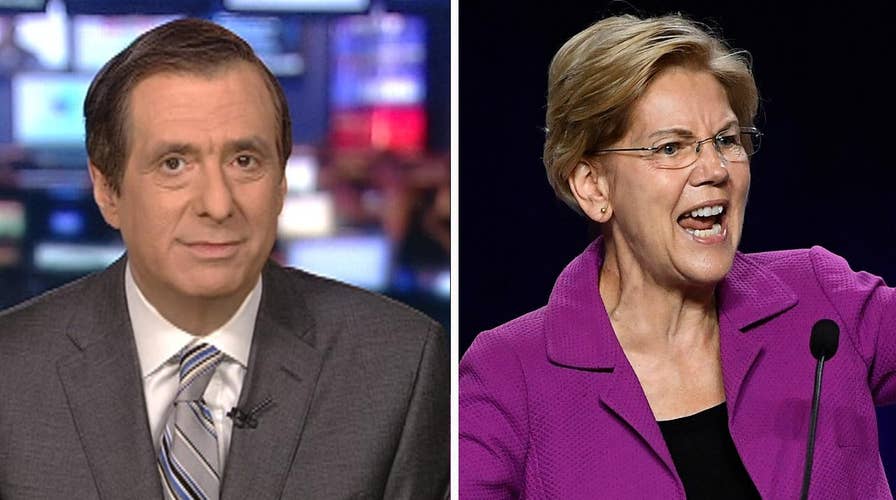Howard Kurtz: Is most of the press rooting for Warren over Biden?
'MediaBuzz' host Howard Kurtz weighs in on the mainstream media barely giving any critical or negative press to Elizabeth Warren while they continue to pile on Joe Biden.
Elizabeth Warren drew an impressive 20,000 people for an anti-corruption speech the other night in the liberal enclave surrounding Manhattan’s Washington Square Park.
Cue the media swoon.
In fact, as Warren has been drawing big crowds, delivering sharp debate performances and inching up in the polls, she has drawn almost no negative press—in marked contrast to Joe Biden.
And the toughest interviewer she’s faced has been liberal comedian Stephen Colbert.
One might even get the impression that most of the media would prefer that an ultra-progressive woman win the nomination as opposed to an old, occasionally stumbling, more moderate white guy who’s been a Washington figure for well over four decades.
There’s no question the Massachusetts senator is the hot candidate right now. The WP has a piece saying she’s demonstrated she can “match the spectacle of Trump, right down to the large, cheering throngs.”
TRUMP TAUNTS TIMES, REPORTERS BLAME EDITORS ON KAVANAUGH
The president, known for bragging about his crowd size since his inauguration, took a swipe at Warren, telling reporters that that “anybody” can attract crowds “standing in the middle of Manhattan in the most densely populated area of the country.”
Big crowds used to be written off as just the party faithful turning out, but now not so much. They can signify excitement and enthusiasm.
To me, what’s more important than her crowds is the way Warren lingers and poses for selfies with anyone who wants one—for an exhausting four hours after the New York speech. That’s a personal touch that makes her approachable, and it’s hard to imagine Bernie Sanders doing something similar.
But the fact remains that Warren, whose embrace of Medicare for All means she would abolish private insurance for 150 million Americans, may be too liberal to win a general election. With a few exceptions, media outlets rarely focus on her potential vulnerabilities or such controversies as her past work for the kind of big corporations she now bashes.
An MSNBC interview with Rachel Maddow on Tuesday night was a lovefest. Maddow praised Warren’s crowds and selfies and asked such questions as, “How do you map that model of social change, of big structural change?”
By contrast, Colbert pressed Warren about her health insurance plan on the “Late Show.” She has successfully deflected these questions at the last two debates, with moderators simply giving up and moving on.
Colbert, a liberal who detests Donald Trump, has turned out to be adept at questioning Democratic candidates, sometimes with humorous barbs. He challenged Biden on his constant gaffes as well.
He told the candidate that she keeps being challenged in debates about how she’ll pay for her health plan, paused for effect, and said: “How are you going to pay for it? Are you going to raise the middle-class taxes?”
Warren reframed the question, as she always does: “Costs are going to go up for the wealthiest Americans, for big corporations--”
He asked again: Will middle-class taxes go up?
SUBSCRIBE TO HOWIE'S MEDIA BUZZMETER PODCAST, A RIFF OF THE DAY'S HOTTEST STORIES
“Well, here’s the thing,” Warren began.
“No, here’s the thing. I’ve listened to these answers a few times before,” Colbert said, before suggesting she simply defend the tax hike.
Nancy Pelosi, meanwhile, explicitly came out yesterday against Medicare for All, telling CNBC’s Jim Cramer that the more feasible path for Democrats is expanding ObamaCare. The speaker knows a land mine when she sees one.
The chatter among pundits now is that Warren could overtake Biden, especially if she wins Iowa and then her neighboring state of New Hampshire. In a new Wall Street Journal/NBC poll, she trails Biden by just 6 points and is statistically tied among white voters, 28 percent to Biden’s 27 percent.
Her problem is that Biden crushes her, 49 to 13 percent, among black voters, who are crucial in South Carolina and then in the big industrial states. She just doesn’t have the same kind of connection as Barack Obama’s vice president.
If Warren keeps surging toward the nomination, the press at some point will be forced to give her tougher scrutiny. But for now, they’re largely content to chronicle her rise and marvel at the size of her crowds.









































